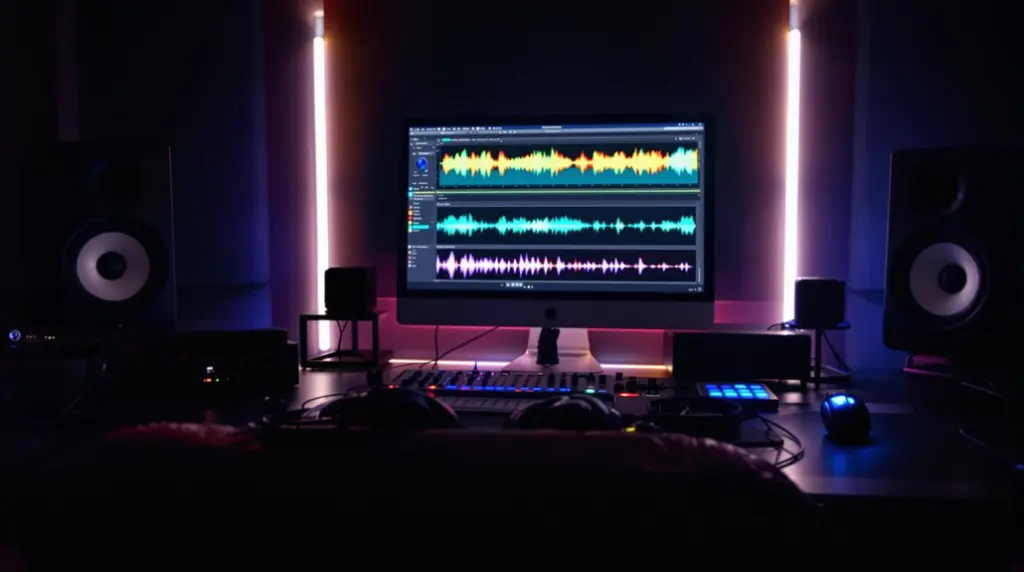When you hire a professional mastering engineer, you’re getting finely-tuned critical listening skills and precision in EQ adjustments to guarantee tonal harmony. They employ advanced audio techniques like multiband compression and dynamic range control for a polished sound. Their specialized equipment offers superior signal processing and peak performance. Mastering engineers also tailor your tracks to meet industry standards and optimize them for various formats. Their expertise guarantees your music resonates with authenticity and emotional impact across genres. You’ll discover how these professionals enhance your tracks to a competitive and cohesive final product.
Key Takeaways
- Mastering engineers possess finely-tuned critical listening skills to discern and correct subtle tonal imperfections.
- They utilize advanced audio techniques like multiband compression and precise EQ adjustments for sonic clarity.
- Mastering engineers ensure genre authenticity while enhancing dynamics, tonal balance, and spatial effects.
- They optimize loudness and meet industry standards for consistent, professional sound quality across platforms.
- Mastering engineers detect and correct audio errors, ensuring high-quality sound reproduction on all playback systems.
Critical Listening Skills
Professional mastering engineers, equipped with finely-tuned critical listening skills, can detect the slightest nuances in audio quality and balance. Through years of training and experience, you develop an acute sense of audio perception, allowing you to discern subtle tonal characteristics and identify even the most minute imperfections in an audio mix. This skill is fundamental in sound analysis, where the goal is to enhance the overall sound quality and balance of the final product.
Your trained ears enable you to pinpoint inconsistencies and areas for improvement that might go unnoticed by the average listener. By focusing on these details, you guarantee that the audio meets industry standards and sounds exceptional across various playback systems. You make precise adjustments in EQ, compression, and other processing techniques to achieve sonic perfection. This meticulous attention to detail ensures that the final master is polished and professional, ready for distribution.
In the domain of professional audio, your expertise in critical listening is invaluable. It’s this level of precision and commitment to audio clarity that sets you apart, making sure that every track you work on is optimized to its fullest potential.
Advanced Audio Techniques
When you’re mastering a track, precise EQ adjustments are essential for sculpting the frequency spectrum and ensuring clarity.
You’ll need to control the dynamic range meticulously to maintain balance and prevent any unwanted peaks.
Utilizing tools like multiband compressors and limiters helps achieve a polished, professional sound that meets industry standards.
Precision EQ Adjustments
By leveraging precision EQ adjustments, mastering engineers can meticulously enhance and balance specific frequencies to achieve peak clarity and tonal harmony in a mix. They utilize frequency precision to identify and address problematic areas within the spectrum, guaranteeing that no unwanted resonances detract from the overall audio quality. This process of audio enhancement involves both cutting and boosting frequencies to optimize the mix’s tonal balance and sonic character.
When you work with a professional mastering engineer, they bring an unparalleled level of expertise in sculpting the tonal landscape of your track. They can make subtle adjustments to bring out the warmth and depth of the low end or highlight the sparkle and definition in the high end. By focusing on frequency precision, these engineers ensure that each element in the mix occupies its own space, creating a cohesive and pleasing listening experience.
Moreover, expert engineers understand the importance of tonal balance. They meticulously tailor each EQ adjustment to complement the track’s sonic character, making sure that the final product translates well across various playback systems. This attention to detail guarantees that your music not only sounds great but also maintains its integrity and impact, regardless of where it’s heard.
Dynamic Range Control
After achieving tonal balance through precision EQ adjustments, mastering engineers employ advanced audio techniques to expertly control dynamic range and enhance the overall impact of the mix.
By using tools like multiband compression, parallel processing, and automation, they maintain a delicate balance between loudness and clarity, securing an ideal dynamic range throughout your track.
Multiband compression allows them to target specific frequency ranges, applying precise adjustments without affecting the entire spectrum. This technique helps bring out subtle details in the audio, making sure every element is heard clearly.
Parallel processing blends compressed and uncompressed signals, adding depth and richness without sacrificing dynamics.
Automation is another critical tool, enabling engineers to make real-time adjustments to volume and effects, ensuring a consistent and polished final product.
Limiters, expanders, and transient shapers are also employed to enhance the impact of audio elements, adding punch and definition where needed.
The expertise in dynamic range control that professional mastering engineers possess results in a track that isn’t only engaging but also meets industry standards across various playback systems and formats.
Their meticulous approach guarantees your music achieves a polished, professional sound quality.
Specialized Equipment
By using high-end analog and digital gear, professional mastering engineers guarantee that each track attains superior signal processing, dynamic range control, and stereo imaging. This specialized equipment is instrumental in achieving a polished, industry-standard sound. Key tools include mastering consoles, equalizers, compressors, and limiters, each designed for precise adjustments and enhancements.
Effective signal processing is essential. Mastering-specific hardware, like tube equalizers and multiband compressors, allows engineers to manage harmonic distortion meticulously. These devices ensure that the track’s integrity is maintained while enhancing its overall sonic quality.
Here’s a breakdown of essential equipment used:
- Mastering Consoles: Centralize control over various signal paths, enabling seamless integration of multiple processing units.
- Equalizers: Fine-tune frequency balance, allowing for precise tonal adjustments.
- Compressors and Limiters: Control dynamic range to maintain consistency and prevent clipping.
- Mastering-Grade Converters and Reference Monitors: Provide accurate sound reproduction, essential for critical listening and decision-making.
The combination of these tools ensures that your track not only meets but exceeds industry standards. By leveraging specialized equipment, mastering engineers deliver tracks with exceptional frequency balance, dynamic clarity, and pristine stereo imaging.
Genre Versatility
You’re looking to achieve peak sound for your music, and genre versatility is key. Professional mastering engineers adapt their techniques to different styles, enhancing each genre’s unique characteristics with precision.
Adapting to Different Styles
Mastering engineers showcase their versatility by expertly adapting their techniques to suit the unique sonic characteristics of each music genre. They use a variety of adaptation techniques and genre interpretation skills to make sure that each track retains its intended feel and character.
Whether you’re working on pop, rock, hip-hop, electronic, or classical, the mastering engineer’s job is to interpret the genre-specific nuances and apply the appropriate adjustments.
Here’s a breakdown of how mastering engineers adapt to different styles:
- Genre Interpretation: Engineers listen closely to the track’s genre and identify its unique elements, such as rhythm, tempo, and instrumentation. This deep understanding informs their approach.
- Adaptation Techniques: They use genre-specific techniques, including tailored EQ adjustments and dynamic processing, to enhance the track’s overall sound quality while preserving its core identity.
- Dynamic Range Management: Different genres have varying dynamic ranges. Engineers adjust compression and limiting to match the genre’s expectations, ensuring clarity without sacrificing dynamics.
- Tonal Balance: Achieving the right tonal balance is important. Engineers adjust frequencies to align with genre norms, making sure that the track sounds polished and professional.
Enhancing Genre Characteristics
By drawing on their profound understanding of genre-specific nuances, professional mastering engineers center their efforts on enriching the distinctive characteristics that define each music genre, guaranteeing tracks resonate with authenticity and competitive edge. Their expertise in genre authenticity involves meticulously tailoring the mastering process to amplify key elements such as dynamics, tonal balance, and spatial effects.
This tailored mastering approach guarantees that each track not only meets industry standards but also stands out within its genre. Mastering engineers employ genre-specific techniques to achieve sonic enhancement, ensuring that the emotional impact and artistic integrity of the music are preserved. For instance, the dynamic range in an orchestral piece will be treated differently from the punchy, compressed sound required in electronic dance music.
This genre versatility ensures that whether it’s hip-hop, rock, or classical, the music sounds authentic and cohesive.
Mix Problem Solving
Identifying and solving mix problems like frequency imbalances and dynamics issues are essential tasks that professional mastering engineers handle with precision and expertise. They excel at detecting and correcting issues such as harshness, muddiness, or lack of clarity, ensuring each track achieves ideal frequency balancing and tonal consistency.
Mastering engineers utilize a combination of critical listening skills and technical knowledge to address these mix challenges. Here’s what they bring to the table:
- Frequency Balancing: They adjust EQ settings to make sure that no frequency range overpowers another, providing a smooth and cohesive sound spectrum.
- Tonal Consistency: They ensure all elements within the mix maintain a consistent tonality, which is vital for a polished and professional-sounding track.
- Harshness Reduction: By identifying and attenuating problematic frequencies, they can eliminate harshness and create a more pleasant listening experience.
- Clarity Enhancement: Through precise EQ adjustments and other techniques, they enhance the overall clarity of the mix, making individual elements more distinct and well-defined.
Their expertise ensures that the final product not only sounds great but also translates well across different playback systems, maintaining industry standards of audio clarity and precision.
Dynamic Range Control
When you control the dynamic range, you achieve a balance between loud and quiet elements, ensuring clarity and cohesion.
By optimizing loudness without sacrificing quality, you make the track impactful across various playback systems.
Precision in dynamic range adjustments is key to enhancing both the track’s balance and its overall loudness.
Balance and Clarity
Mastering engineers meticulously balance the dynamic range to guarantee a track’s volume levels are consistent and polished. They employ audio enhancement techniques to guarantee balance and clarity, making sure each element within the track is precisely positioned and audible.
By controlling the peaks and valleys in the audio signals, they enhance the overall impact and clarity of the music, securing it translates well across various playback systems.
To achieve this, mastering engineers focus on:
- Compression Techniques: Applying compression to manage dynamic range, securing that quiet parts are audible and loud parts are controlled without introducing distortion.
- Equalization (EQ): Fine-tuning the frequencies to secure each element of the mix is clear and occupies its proper space, contributing to a balanced sound.
- Limiting: Using limiters to prevent clipping and distortion by keeping the audio signal within a specified range, securing a clean, undistorted final product.
- Stereo Field Enhancement: Adjusting the stereo width to create a more immersive listening experience, securing that the audio sounds great on both headphones and speakers.
Through these techniques, mastering engineers create a balanced mix that maintains the original dynamics while optimizing the audio for different playback systems, achieving a harmonious balance between loudness and dynamics.
Loudness Optimization
To achieve peak loudness while preserving dynamic integrity, professional mastering engineers meticulously control the dynamic range using advanced techniques. By employing methods like compression and limiting, they effectively manage the dynamic range, guaranteeing your tracks sound balanced and consistent across various listening environments.
Importance optimization is vital in today’s audio landscape, where tracks must meet industry standards and streaming platform requirements. Mastering engineers use their expertise to apply just the right amount of compression, preventing the music from sounding overly squashed while maintaining its punch and clarity. They also utilize limiting to make sure that the audio peaks don’t exceed a certain level, avoiding distortion and clipping.
These mastering techniques are essential for making your track sound competitive in the market. A well-optimized track will stand out, engaging listeners with its impactful and clear sound. Through precise dynamic range control, mastering engineers not only enhance the overall loudness but also preserve the emotional nuances of the music.
Final Sound Enhancement
Professional mastering engineers meticulously adjust audio levels, frequencies, and dynamics to achieve ideal clarity and balance in the final sound. Their expertise brings vital sound refinement and audio enhancement to your tracks, guaranteeing that every element is precisely tuned. By applying industry-standard techniques and advanced tools, they achieve the final polish and sonic clarity needed to make your music stand out.
Here’s what they do to enhance the final sound:
- Equalization (EQ): Engineers use EQ to balance frequencies, removing any unwanted tones and enhancing the overall sonic profile.
- Compression: They apply compression to control dynamics, ensuring that no part of the track is too loud or too soft, and maintaining a consistent volume.
- Spatial Enhancement: By manipulating stereo width and depth, engineers create a more immersive and engaging listening experience.
- Harmonic Excitement: Adding subtle harmonic distortion can make the audio sound richer and more vibrant.
Mastering engineers use these techniques to bring your music to a professional standard, addressing any mix issues and elevating the overall sonic characteristics. Their precision ensures that your tracks aren’t just good but exceptional, ready for any platform or medium.
Format Optimization
In format optimization, engineers tailor your tracks for various distribution mediums, ensuring peak sound quality and consistency across platforms. They achieve this through precise audio format conversion, transforming your tracks to meet the technical requirements of each medium.
Whether it’s streaming platforms, vinyl, CD, or digital downloads, mastering engineers use sound quality calibration to guarantee your music sounds its best everywhere.
Platform compatibility is vital. Streaming services like Spotify and Apple Music have unique audio specifications. Mastering engineers understand these nuances and optimize audio files accordingly, making sure your tracks maintain fidelity across platforms. This meticulous process involves adjusting levels, equalization, and dynamic range to meet the specific demands of each format.
Audio file optimization isn’t just about meeting technical specs—it’s about enhancing the listener’s experience. Professional mastering engineers leverage their expertise to fine-tune tracks, ensuring that the sound remains impactful and consistent. They make informed decisions based on the format’s characteristics, whether it’s the warm, immersive sound of vinyl or the clean, precise audio of digital files.
Error Detection
Mastering engineers excel at detecting and correcting technical issues like clicks, pops, and distortion in audio mixes, guaranteeing every track meets industry standards. Their expertise allows them to identify and address audio imperfections that may go unnoticed by the untrained ear. This vigilance in error detection is vital for producing a polished and flawless final product.
By pinpointing and resolving mastering errors, these professionals ensure that listeners experience smooth, uninterrupted audio. Their keen attention to detail not only enhances the overall listening experience but also enhances the track’s professionalism and quality. Here’s how mastering engineers manage error detection:
- Identifying Audio Imperfections: They use advanced tools and keen listening skills to detect subtle imperfections, such as clicks, pops, and unwanted noise.
- Correcting Mastering Errors: They apply precise techniques and software to rectify these issues, ensuring the audio is clean and smooth.
- Ensuring Consistency: They check for uniform sound quality across different playback systems, ensuring the track sounds great everywhere.
- Final Quality Control: Before finalizing, they conduct rigorous quality checks to catch any remaining errors, guaranteeing the track meets professional standards.
Mastering engineers’ meticulous approach to error detection ensures your music is presented at its best.
Industry Standards
After guaranteeing error-free audio, mastering engineers focus on upholding industry standards to make sure tracks meet commercial expectations. They meticulously apply audio quality standards through precise mastering techniques, utilizing high-end analog and digital equipment. This process ensures your tracks are polished and radio-ready.
Mastering engineers optimize each track for various distribution mediums like streaming platforms, vinyl, and CDs. Each medium has distinct requirements, and mastering techniques must adapt to meet these specifications. For instance, streaming platforms often demand a different loudness level compared to physical formats.
By adhering to industry standards, these professionals ensure your music sounds its best across all platforms. They bring an objective perspective to the mastering process, identifying areas for improvement that you might overlook. This fresh set of ears can make the difference between a good track and a great one.
Investing in a professional mastering engineer means entrusting your music to someone who understands the intricacies of audio quality standards and commercial expectations. Their expertise enhances the overall quality of your music, giving it the best chance for success in a competitive market. This meticulous attention to detail ensures your tracks stand out and meet industry benchmarks.
Frequently Asked Questions
What Makes a Good Mastering Engineer?
A good mastering engineer blends top-tier equipment quality with artistic intuition. They guarantee technical precision, audio clarity, and adherence to industry standards, providing your tracks with a competitive edge across various distribution mediums and maintaining a cohesive sound.
Why Are Mastering Engineers Important?
Mastering engineers are crucial because they guarantee audio consistency and maximize dynamic range. They adhere to industry standards, providing technical precision and audio clarity, making your tracks polished and ready for various distribution mediums.
What Are the Responsibilities of a Mastering Engineer?
You guarantee the mastering process enhances audio quality by using EQ, compression, and spatial enhancement. You uphold format compatibility, detect errors, and adhere to industry standards, delivering a polished, radio-ready track that stands out.
What Skills Do Mastering Engineers Need?
You need technical proficiency with audio processing tools and a deep acoustic understanding. Critical listening skills, objectivity, and strong communication abilities are essential to identify and enhance music nuances, ensuring it meets industry standards.
Conclusion
In mastering your tracks, a professional engineer brings unparalleled expertise. They deploy critical listening skills, advanced techniques, and specialized equipment to enhance your mix.
Their genre versatility guarantees your music meets industry standards, while their problem-solving capabilities improve final sound quality. They’ll optimize formats and detect errors you might miss.
Trusting a professional mastering engineer guarantees your music stands out with technical precision and audio clarity, ready for any platform or format.




